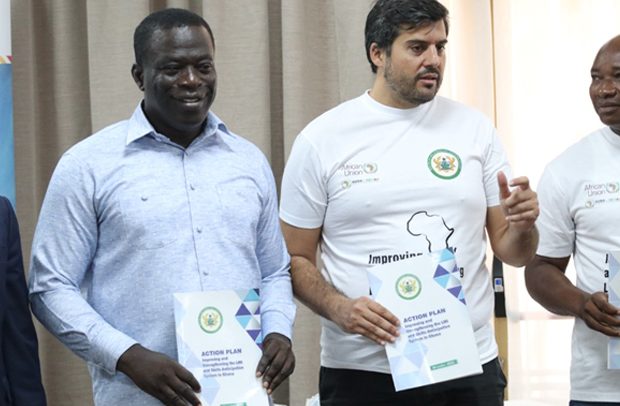Ignatius Baffour Awuah and David Marcos
A NATIONAL action plan to enhance the capacity of institutions to address skills mismatch and imbalances in organisations has been launched.
Minister for Employment and Labour Relations, Ignatius Baffour Awuah, who launched the project, underscored the importance of having a labour market information system in the country.
According to him, this would help in policy decision making, noting that the ministry ought to churn out such information to the government and the public.
He lamented, “We continue to use manual systems for gathering information” in the 21st century where the world is driven by technology, explaining that the national action plan was intended to improve and strengthen labour market information and skills anticipation systems in Ghana.
It would also enable institutions, both public and private, to effectively apply knowledge, technical skills and strategies to ensure that they hire the right skills set for the right jobs, he added
The officer in charge of the project, David Marcos, said mismatch and imbalance between the demand and supply of skills contributed to costly economic inefficacies.
He stated that these included difficult transition from education to productive employment and under utilisation of existing skills at the workplace.
“It is an established fact that countries that have succeeded in linking skills to productivity employment and enhanced development have targeted gains, developed policies towards matching supply to demand for skills,” he noted.
He made the remarks on behalf of the Country Director of the ILO Office for Ghana, Liberia and Sierra Leone, Vanessa Phala.
Mr. Marcos asserted that countries that have succeeded in linking skills to productivity employment and enhanced development targeted skills development policies towards matching supply to demand for skills.
He said skills development programmes usually either lacked quality and orientation to demand, did not meet labour market skills requirements or the social demand for accessible skills development that could lead to improved employability.
“Weak skills development outcomes and the lack of standards among skills development providers, which impact the comparability and quality assurance of programmes and certificates, contribute to widen the gap between the skills offered and those needed in labour markets,” he added.
He intimated that this, coupled with tensions between a rapidly growing young population and relatively low pace of job creation, was the cause for more determined action and partnerships for more informed skills development approaches and quality jobs for young Africans.
By Ernest Kofi Adu


